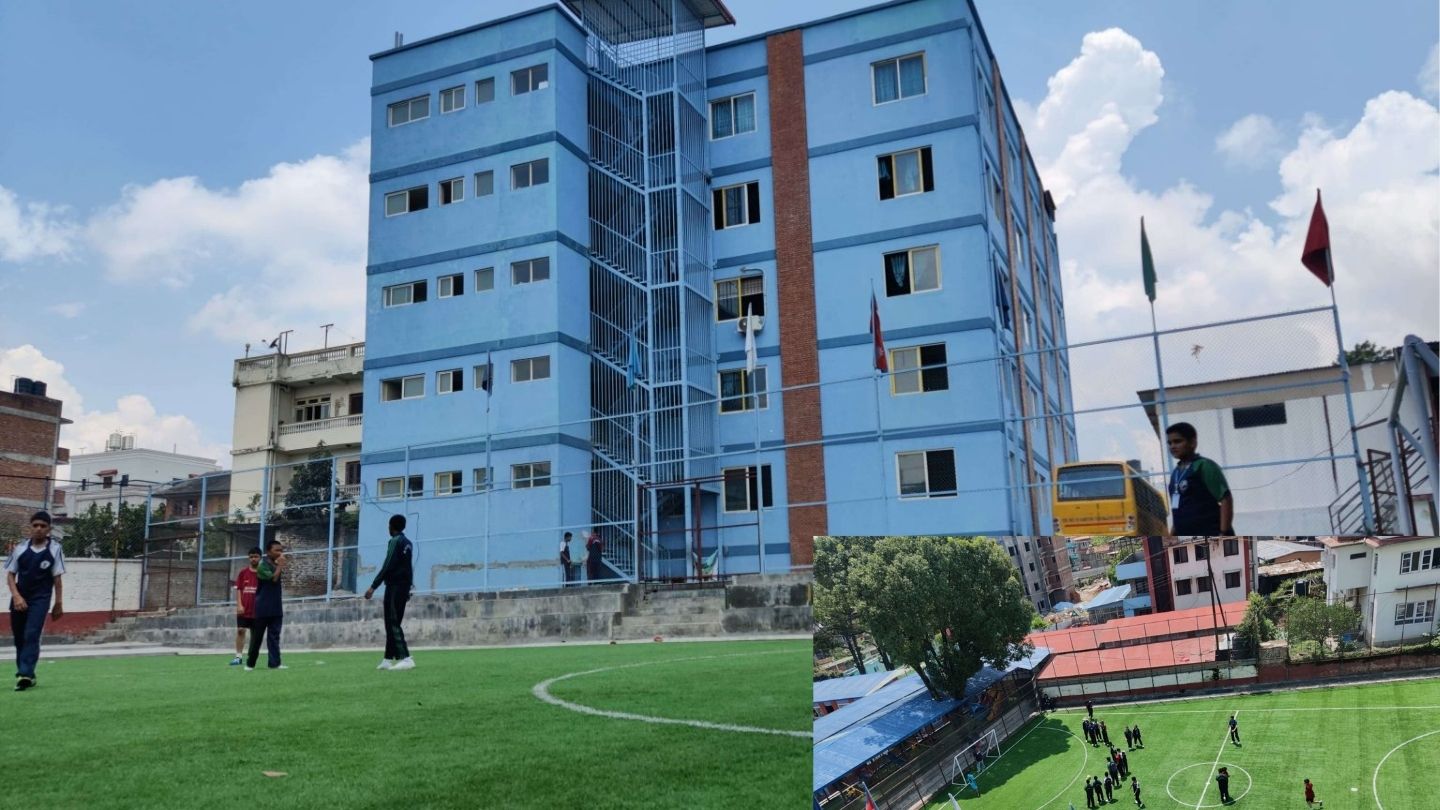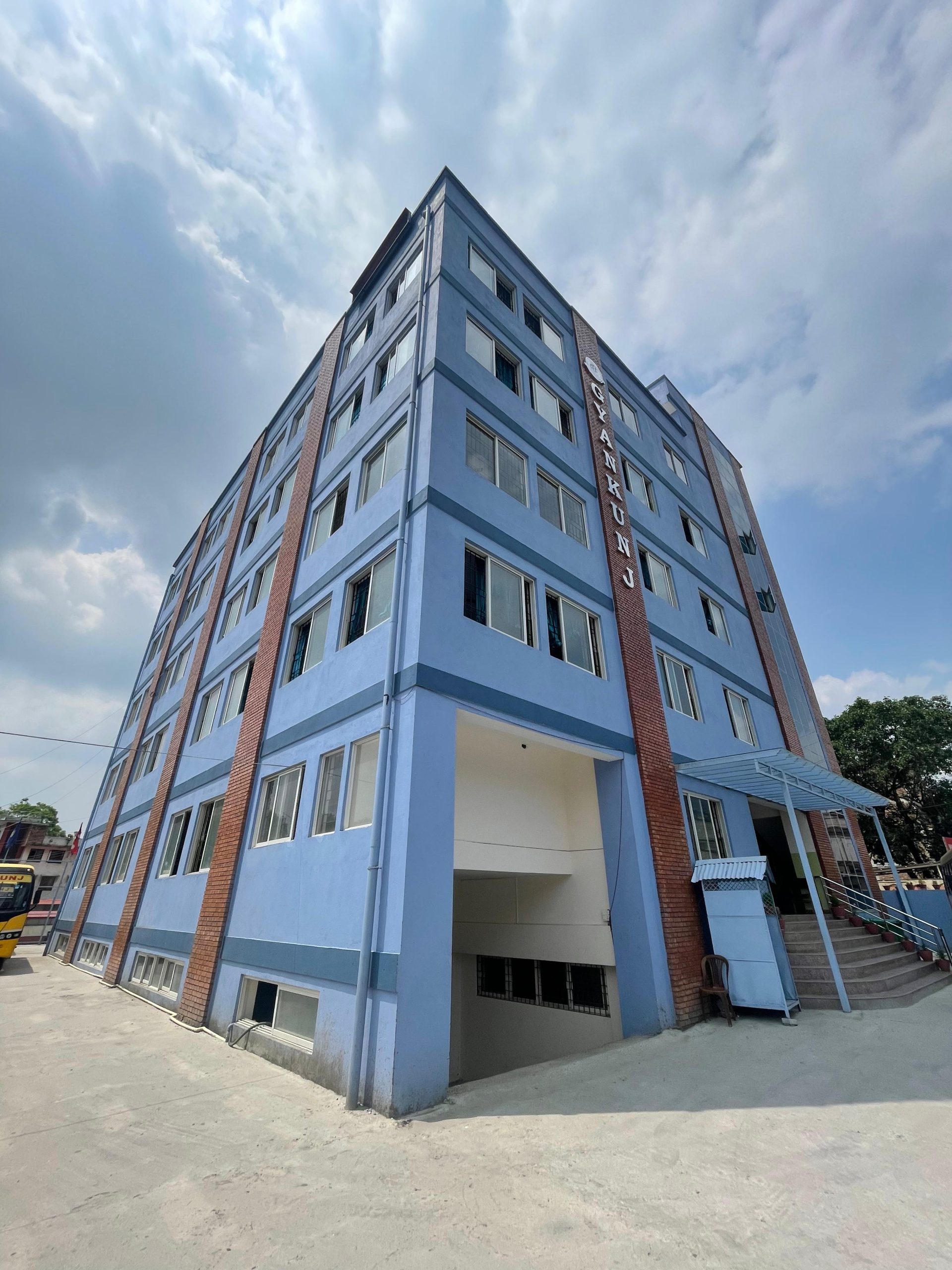Overview
Gyankunj College (Gyankunj SS & College) is a secondary school and college in Ravibhawan–Macchagate, Kathmandu, Nepal. Established in 1990 AD (2046 BS), it runs Ten Plus Two (+2) programs under the National Examination Board (NEB) and a Bachelor of Business Studies (BBS) program affiliated with Tribhuvan University (TU).

Introduction
Gyankunj began with a simple goal: help young people grow into capable, ethical graduates who contribute to society. The campus sits in a well-connected part of Kathmandu and offers school-level education, higher secondary (+2) in Science, Management, and Humanities, and a TU-affiliated BBS.
Over three decades, the college has expanded its labs, library, ICT facilities, and student support. Daily routines highlight punctuality, steady study habits, and respectful conduct. Counselors guide learners after SEE, support NEB exam preparation, and map next steps for university or early careers.
Quick Highlights
-
Established: 1990 AD (2046 BS)
-
Location: Ravibhawan–Macchagate, Kathmandu
-
Affiliation: NEB (+2) and Tribhuvan University (BBS)
-
Continuum: Pre-primary to Bachelor’s level
-
+2 Streams: Science, Management, Humanities
-
Bachelor’s Program: BBS (TU)
-
Facilities: Science labs, computer lab, library, sports, canteen, transport, hostel (for out-of-station students)
-
Student Support: Counseling, study and career guidance, academic feedback
-
Scholarships: Merit and need-based (including internal awards)
Academic Programs Offered
Ten Plus Two (+2) Science
This stream builds a strong base in Physics, Chemistry, Biology, and Mathematics. Practical work in separate labs helps you connect concepts with real examples. Many students choose this path for medicine, engineering, agriculture, analytics, or research.
Key features
-
Dedicated Physics, Chemistry, and Biology labs
-
Math support hours and problem-solving sessions
-
Guidance for medical, engineering, and related entrance tests
Ten Plus Two (+2) Management
Here you study accounting, economics, business studies, and communication. The course builds numerical accuracy, analytical habits, and presentation skills—useful for business degrees, hospitality, entrepreneurship, banking, and public administration.
Key features
-
Accounting and economics with step-by-step classroom demonstrations
-
Business communication through presentations and written tasks
-
Exposure to local market contexts and simple case discussions
Ten Plus Two (+2) Humanities
This stream prepares you for social sciences, media, education, public service, and development work. You practice careful reading, clear writing, and analysis across social studies and language subjects. Project work builds observation and reporting skills.
Key features
-
Focus on reading, composition, and civic understanding
-
Guided projects, field notes, and review workshops
-
Suitable preparation for BA and related degrees
Bachelor of Business Studies (BBS) — Tribhuvan University
BBS covers accounting, finance, marketing, economics, organizational behavior, and business law under TU guidelines. You learn to handle numbers, read documents critically, and write clear reports. Graduates move into corporate roles, banking, entrepreneurship, NGOs, or further study in management and finance.
Key features
-
TU-aligned courses and assessments
-
Core and specialization subjects with applied tasks
-
Mentoring for internships, early career planning, and postgraduate options
Admission Process
Gyankunj follows a clear and fair admission process for school and college levels. Selection looks at your academic record, fit for the chosen stream, and entrance test performance.
Step-by-step
-
Collect the application form from the front desk (or as instructed).
-
Submit the form with mark sheet, character certificate, transfer certificate, and two passport-size photos within the deadline.
-
Sit for the entrance test (stream-specific for +2; as required for BBS).
-
If selected, visit with a parent/guardian for counseling and enrollment.
New students attend an orientation on course structure, internal evaluation, attendance, lab rules, and library use.
Teaching Faculty and Learning Methodology
Subject specialists teach at both school and college levels. Classes use board work, past-paper examples, and guided practice. Lab subjects include pre-lab briefings, safety steps, and short reflections after practicals. Management and humanities classes often use case notes, data tables, and concise essays.
Academic support methods
-
Regular unit tests and terminal exams
-
Feedback meetings to review progress and set goals
-
Counseling for subject choice, time management, and exam strategy
-
Encouragement of note-making, spaced revision, and concept maps
Infrastructure and Learning Facilities

Laboratories
Separate Physics, Chemistry, and Biology labs support +2 Science practicals and demonstrations. Sessions build measurement accuracy, troubleshooting skills, and careful record-keeping.
Computer Lab
An ICT lab supports assignments, data work, and basic programming where required. Internet access is available for curriculum-relevant research under staff supervision.
Library
The library holds course texts, reference books, journals, and periodicals. Quiet reading space helps with focused study. New titles are added based on syllabus needs and student requests.
Classrooms
Classrooms are ventilated and well-lit for focused learning. Seating plans and schedules help balance lab, library, and classroom time.
Hostel and Transportation
Hostel rooms are available for out-of-station students. Transport runs on selected routes. Both follow safety and conduct policies.
Canteen and Health Care
The canteen serves simple, hygienic meals and refreshments at reasonable prices. Basic first-aid and health referrals are available through the office.
Sports and Recreation
Facilities support volleyball, football, basketball, table tennis, badminton, and cricket. Scheduled practice promotes fitness, teamwork, and leadership.
Student Life and Campus Experience
Daily life at Gyankunj values punctuality, respectful communication, and steady effort. Classes rotate between teaching, practice, and feedback. Attendance, assignments, and exam prep are tracked with regular updates to students and guardians.
Student committees plan events with staff guidance. Mentoring pairs seniors with juniors for study tips and past-paper practice. Career talks by alumni and local professionals add real-world context and stress professional ethics.
Extracurricular Activities (ECA)
ECA adds balance to academic work. Common activities include:
-
Annual day and cultural programs
-
Debate, essay, quiz, and spelling contests
-
Educational visits and short excursions
-
Sports meets and inter-class tournaments
-
Community service and social awareness events
These activities build confidence, teamwork, public speaking, and planning skills.
Scholarships and Financial Support
Gyankunj offers merit and need-based support. Categories may vary each year, but typically include:
-
Scholarships linked to NEB results
-
Entrance test scholarships (as per internal criteria)
-
Term-topper scholarships
-
Support for students from under-resourced backgrounds
-
Chairman, Principal, and Director scholarships (as announced)
Applicants should contact the administration during the admission window with supporting documents. Awards follow the college policy and yearly budget.
Achievements and Institutional Milestones
Gyankunj has grown from a neighborhood school to a continuum that spans pre-primary to bachelor’s level. Alumni work in business, banking, education, engineering, health, media, and public service. Teachers guide NEB preparation, and internal test data inform targeted support classes.
Milestones include lab upgrades, library expansion, and regular policy reviews for assessment and student conduct. Feedback from students and guardians helps keep teaching aligned with curriculum goals.
Why Choose Gyankunj College?
Central location in Kathmandu
Ravibhawan–Macchagate is reachable from many parts of the city, with transport options for daily travel.
Single-campus pathway
You can move from SEE to +2 and then to TU-affiliated BBS on the same campus, with consistent records and counseling.
Structured teaching and timely feedback
Regular tests, guided assignments, and teacher consultations help you stay on track for board and university standards.
Labs, library, and ICT
Practical spaces and a computer lab support hands-on learning. The library offers resources for deeper study.
Active student life
Sports, arts, debates, and community events help you build confidence and communication skills.
Financial support
Merit and need-based options reduce barriers for eligible students.
Conclusion
Gyankunj SS & College offers a steady route from school to higher education with NEB-aligned +2 programs and a TU-affiliated BBS. The campus pairs clear academic routines with accessible facilities, scholarships, and practical guidance for exams and careers. For families seeking Science, Management, or Humanities at +2—and a direct step into TU’s BBS—this college provides a calm, structured learning space in the heart of Kathmandu.
Contact Gyankunj College's administrative office for detailed information on the course, admissions, location, fees, scholarships, facilities, counseling or eligibility.
Contact Details
Gyankunj College
Email Address: gyankunjs.s2046@gmail.com
Phone Number: +977-1-4031623, +977-1-4031687, +977-1-4031513
website: https://gyankunjschool.edu.np
Location: Near Kalanki, Ravibhawan, Machhagate, Kathmandu

















